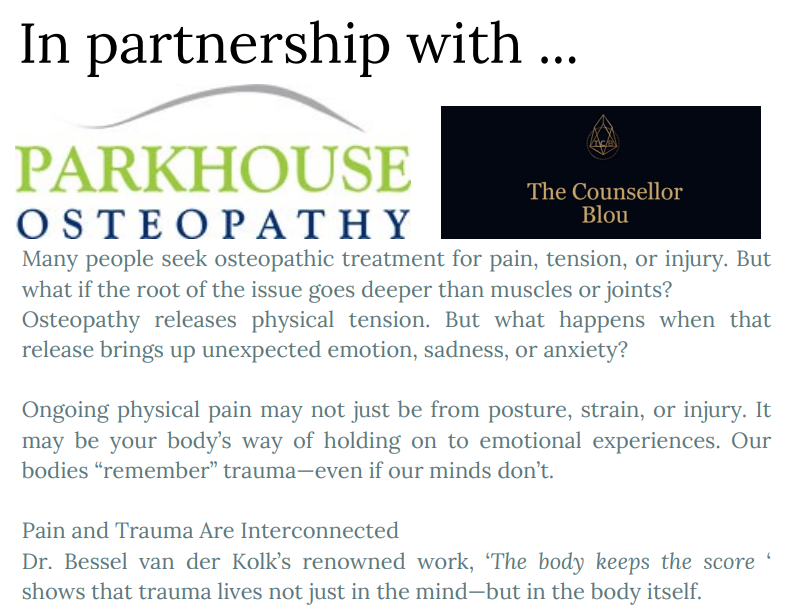

For Osteopathy with Joe
For Counselling with Blou


For Osteopathy with Joe
For Counselling with Blou

Author: Liz Stratton
Hypnotherapist, Past Life/ Inter Life Therapist
The ego is misunderstood in society today. It is the one thing that people avoid looking at as too much ego is usually viewed as a bad thing. But ego is a natural part of us, and we all need ego strength, to enable us to feel confident, express our individuality and be resilient in life.
We comprehend the word through the ego, it allows us to absorb all the sensory information around us and form an awareness of our reality by putting it into a context that we can understand, using form and content.
However, the ego often takes over control of the creation of this framework and applies a perception to situations that is distorted or biased. This happens when the ego gets stuck in its expansion. For example, imagine your partner accidentally deletes your favourite programme that you have saved to watch. The content is – the programme is deleted, by accident. The ego may interpret this as “they did that on purpose”, or “they don’t care about me.”

We can work to mature our ego, to move it through the stages and understand where we are. It is important to note that the ego often confuses us and makes us feel bad for valuing ourselves, acting confidently, putting ourselves first or speaking our minds. Society has a big part to play in this as well, with the concept of altruism so widely celebrated.
To develop your ego and establish what stage it is at there are a few things you can do:
For more information or to book an appointment with Liz:
Email: [email protected]
Phone: 07769 331055
Concessions are available for students, low waged and OAPs.

Accredited Transpersonal Life Coach
“The more you wake up to who you are, the more it becomes unbearable to be who you are not.”
Aubrey Marcus
Freedom is a common value that I often hear clients want more in their life. Their definition will be unique to them and their definition evolves, as they evolve. I was sitting in a forum listening to a women speak about her life being a pretty picture and perfect from the outside.
She had hit her career goals, had her own house and looked after her appearance, but didn’t feel alive or joyful.
She said “I just want to colour outside the lines”.
Imagine a picture that has been coloured neatly within the parameters of the lines. This ladies’ life was very much like this. The pay off was unnecessary pressure and overwhelm that had diluted her joy. When we begin to look inward and bring the unconscious conscious. We can put a spotlight on what inner chains that are holding us back from leading a fulfilling life.
These inner chains are not bad, because they were created with the best perceptive we had access to at the time. Often to keep us safe, accepted/validated or loved.
Therefore, I wanted to invite you to explore this question;
You are the artist of yourself, express yourself fully.
And…. Remember, every moment is an opportunity to make a new choice.
Love Kelly
Kelly Turner is an Accredited Transpersonal Life Coach and Energy Practitioner. She works with individuals that want to move forward by unlocking the unconscious processes that are keeping them stuck, emotionally drained and overwhelmed. Kelly helps people enhance the relationship with themselves by listening to their own truth and create meaningful change in their life with confidence.
Email: [email protected]

Hypnotherapist, Past Life/ Inter Life Therapist – CHP (NC), DPLT, RGN, BA Ed (Hons), MA, NLP (MP)
What is Overwhelm? “I can’t think straight.” Overwhelm is a feeling that everything is on top of you, it has all become too much. Sometimes it can be experienced as an inability to focus or concentrate, other times it can manifest as physical fatigue or even aches and pains. It can be accompanied by feelings of anxiety or panic, or a feeling that you just can’t go on.
It can happen if we take on too much in our work or personal life, if our responsibilities are weighing us down, or at times of great pressure and stress. Often if we have weak or insecure boundaries, overwhelm can happen more frequently, as the tendency to try to do everything and take it all on can lead to repeated states of overwhelm. Our emotions may be volatile and we may become irritable or snappy with people around us. Also sleep and or eating may be affected.

Here are some self-help strategies to assist with overwhelm:
If you have read the above and you feel like you would benefit from professional help, then please get in touch.
Psychosexual & Relationship Therapist
Both men and women experience changes in their sex lives as they get older – this is normal and to be expected. However, these changes can cause relationship issues and I work with clients to resolve these, whether individually or as part of a couple.

Examples of these include women going through the menopause, or peri menopause, who are experiencing vaginal dryness and lack of sex drive, men who are finding it more difficult to sustain an erection and clients who may have been inactive sexually for a long time and are now entering a new sexual relationship.
The clients that I work with have seen positive changes and in many cases their issues have been completely resolved and eradicated. If you are experiencing changes in your sex life at 50+ then the support is available – don’t assume that nothing can be done.
After all, we are all living longer now so having a fulfilling sex life of our choosing is possible for our entire lifetime.
For more information on Carolyn and the services she provides:

Author: Joe Parkhouse
Osteopath
On your first visit with an osteopath, and before examination begins, the osteopath will discuss and record your medical history in detail.
During examination and treatment from your osteopath, you will normally be asked to remove some of your outer clothing.
Please wear underwear, shorts or sports bra that you feel comfortable in.
Your osteopath will then apply a highly developed sense of touch to identify points of weakness or excessive strain throughout the body.
Your osteopath should make you feel at ease and tell you what is happening throughout your consultation.
You should ask questions if you have any concerns.
Osteopathy can help most people, and our osteopaths work closely hand in hand with the other therapists in the clinic to always achieve the optimal results. If further medical treatment is needed the osteopath may contact your doctor, with your permission.

Joint manipulation is characteristically associated with the production of an audible clicking sound.
When a manipulation is performed, the applied force separates the joint surfaces of a fully encapsulated synovial joint.
This stretches the joint capsule, which in turn creates a reduction in pressure within the joint cavity. In this low pressure environment, some of the gases that are dissolved in the synovial fluid leave the solution creating a bubble which rapidly collapses upon itself, resulting in a ‘clicking’ sound.
To view more details or to book in with Joe, click here.

Author: Joe Parkhouse
Low back pain and sciatica symptoms are common throughout the population with prevalence in the UK thought to be as high as 40%. Sciatica can affect people of any age but is more common in individuals aged between 35 and 65.
Sciatica is the name of any symptoms caused by irritation or compression of the sciatic nerve. The sciatic nerve runs from the 4th and 5th vertebrae of the lumbar spine (lower back) through your pelvis and buttocks, down the back of both legs and terminates at your feet.
There are numerous possible causes of sciatica. The majority of cases are caused by a herniated or ‘slipped’ disc at the base of the lumbar spine that compress the sciatic nerve however there are a variety of conditions so it should be checked out by a health professional. A health professional such an osteopath would be able to determine the cause and undertake the correct treatment and rehabilitation plan.
When compression of the sciatic nerve occurs it can cause a number of symptoms radiating from your lower back into your legs, including pain, numbness and tingling. The level of pain experienced varies depending upon the individual but can range from mild to excruciating. Mild sciatica can ease naturally, however if symptoms are persistent or severe you should seek medical advice.

You should seek emergency medical attention if you experience loss of feeling between your legs and around your buttocks (saddle anaesthesia) or if you lose control of your bowel or bladder function. Although this is rare it can be a sign of a serious medical condition called Cauda Equina Syndrome.
The NICE (The National Institute for Health and Care Excellence) guidelines suggest a course of manual therapy including spinal manipulation, spinal mobilisation and soft tissue massage for the treatment and management of low back pain. Mobilisation, massage and spinal manipulation can be performed by osteopaths, as well as by doctors and physiotherapists who have undergone specialist postgraduate training in manipulation.
For an appointment or for some advice regarding your low back pain or any other symptoms you may be getting from arthritis to sports injuries and much more, please call 07769346278 or email [email protected].

Author: George Whitaker
Hypnotherapy for Anxiety (& More)
Do you have anxiety? If so, you’ll know how overwhelming it can feel.
It can seem like it’s taking over your life, leaving you nowhere else to turn.
Worries can grow and seem to be never-ending – in my last post I talked about ‘the worry mushroom syndrome’ which really is a good analogy for how it can feel.
Anxiety can make everyday activities feel almost impossible.
Read more about ‘the worry mushroom syndrome’ here – https://parkhousetherapycentre.co.uk/why-do-i-worry-all-the-time-what-should-i-do-about-it/

What is Anxiety?
Anxiety can affect us in many different ways, causing us to feel worried, scared or uneasy. We can create anxiety by negatively forecasting the future, such as worrying about events which are coming up (e.g. we could be anxious about an upcoming social event or presentation that we have to give in work). We can also create anxiety by negatively ruminating on the past, regretting or feeling negative about memories and events which have happened in our lives.
How can Anxiety show itself?
Anxiety can affect us in so many different ways and so many conditions rely on anxiety to thrive, including:
– Obsessive Compulsive Disorder – when a person has obsessive thoughts and compulsive behaviours
– Post Traumatic Stress Disorder – caused by very stressful, frightening or distressing events
– Depersonalisation & Derealisation – a feeling of being outside of yourself or not feeling like the world around you is real
– Generalised Anxiety Disorder – persistent and excessive worrying (it could be about anything, e.g. money, health, family or work)
– Panic Disorder – when a person has regular, sudden panic attacks
– Social Anxiety Disorder – an intense, persistent fear of being watched and judged by others
– Phobias – when someone has an overwhelming and debilitating fear of an object, place, situation, feeling or animal

How is Anxiety caused?
It might be obvious to us why we’re anxious, but it might also be that we’re so used to feeling anxious that we don’t know why we feel this way any more. In hypnotherapy we use the analogy of a stress bucket – all of our stresses are put into an imaginary bucket, and if we don’t empty it then sooner or later it will overflow. This is when anxiety can hit us with full force, creating a vicious, negative cycle in our minds, leading to more negative thoughts, more anxiety and more problems.
The Effects of Anxiety
Anxiety can stop us from doing the things we really want to in life.
It can effect us in so many different ways from OCD to GAD.
GAD (Generalised Anxiety Disorder) is thought to affect as much as 5% of the UK population, with slightly more women affected than men, and most common in those aged between 35 and 39 (NHS figures, as of May 2021). Those with GAD feel constantly anxious, unable to relax and trapped in a constant vicious cycle of negative thoughts.
Social anxiety is also commonly seen in those with high anxiety. You may feel overwhelmed and unable to attend social situations, scared to interact with new people or even with people you know well.
Anyone with high anxiety can experience panic attacks, characterised by a period of intense fear and physical reactions such as hyper-ventilating, increased heart rate and high blood pressure. It may feel like you’re losing control, having a heart attack or dying.
So, How can Hypnotherapy Help with Anxiety?
Hypnotherapy has been shown to be very effective in relieving anxiety. Hypnosis uses deep relaxation and visualisation to help you relax, breaking you out of that vicious cycle of negative thinking. This deep relaxation will assist in giving you more intellectual control, and allow you to clearly see the best way forward in your life.
If you’d like to find out how Whitaker Hypnotherapy can aid in relieving anxiety in your life, please go to https://www.whitakerhypnotherapy.co.uk/reduce-anxiety
If you know this is the step you want to take and want to get started straight away, please book a free initial consultation by going to https://www.whitakerhypnotherapy.co.uk/free-initial-consultation
If you’re still unsure and don’t know the best step forward, please contact me and I will be happy to help – E: [email protected]/ P: 07470111303
Thanks for reading this article and please share to anyone it may help.

Author: George Whitaker
Hypnotherapy for Anxiety (& More)
One of my all-time favourite books is ‘The Chimp Paradox’ by Dr Steve Peters. It is an excellent book that I would strongly suggest that everyone reads, no matter what job you have or where you are in life. The book explains why we act the way we do, and how we all have a chimp and human side to us. It really helps highlight why we do certain things and shows that we’re not as weird and different to everyone else after all!
One paragraph in the book really resonated with me – ‘The Mushroom Syndrome’.
When mushrooms grow they constantly compete for space. When a mushroom is big enough, you pick it, and the next largest will grow and fill its space. When this one is picked, the same process happens again. There is always a mushroom ready to grow and fill the gap.

For some people, they grow worries the same way – when a worry disappears, the next one grows and fills their mind. No matter how serious or potent the worry, there’s always one occupying their mind. It’s sometimes said (by others looking in) that these people are worrying about having nothing to worry about!
Don’t worry, there’s an answer to your worries! Dr Peters suggests that worrying is a learned destructive habit. It’s tiring for both the individual and people around them, because worries seem to sprout up from nowhere.
No matter how hard we try, there will always be concerns occupying our minds. It’s normal and healthy to have some; However, there are steps that you can take if you find yourself constantly worrying into a state of stress, and displaying signs of the mushroom syndrome:
After reading this, do you feel that you suffer or have ever suffered from the mushroom syndrome? If you don’t yourself, I’m sure you know others that do. I’ve certainly found myself having the mushroom syndrome at times, and often find mushrooms (worries) sprouting up if left unchecked. But, by having a positive/ neutral thought ready, you can help to combat worries as soon as they’re discovered (rather than allowing them to grow and take over your head-space).
If you’re interested in learning more about how our minds work in everyday life, I really would suggest checking out ‘The Chimp Paradox’ by Dr Steve Peters (I’m not earning commission for recommending it either!).
Thanks for reading this and please leave a like if you found it interesting.
Also, please share on to others if it could help them too.
To find out how we can help you with your anxiety, please go to https://www.whitakerhypnotherapy.co.uk/reduce-anxiety
On to the final question – How are you going to reduce your worrying today?
I also run a training company specialising in Mental Health courses for businesses. For more information on this, please go to www.whitakertraining.co.uk